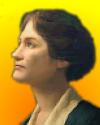 (source)
(source)
|
Cecilia Payne
(10 May 1900 - 7 Dec 1979)
English-American astronomer.
|
Science Quotes by Cecilia Payne (6 quotes)
No idea should be suppressed. … And it applies to ideas that look like nonsense. We must not forget that some of the best ideas seemed like nonsense at first. The truth will prevail in the end. Nonsense will fall of its own weight, by a sort of intellectual law of gravitation. If we bat it about, we shall only keep an error in the air a little longer. And a new truth will go into orbit.
— Cecilia Payne
In Cecilia Payne-Gaposchkin: An Autobiography and Other Recollections (1996), 233.
The advanced course in physics began with Rutherford’s lectures. I was the only woman student who attended them and the regulations required that women should sit by themselves in the front row. There had been a time when a chaperone was necessary but mercifully that day was past. At every lecture Rutherford would gaze at me pointedly, as I sat by myself under his very nose, and would begin in his stentorian voice: “Ladies and Gentlemen”. All the boys regularly greeted this witticism with thunderous applause, stamping with their feet in the traditional manner, and at every lecture I wished I could sink into the earth. To this day I instinctively take my place as far back as possible in a lecture room.
— Cecilia Payne
In Cecilia Payne-Gaposchkin: An Autobiography and Other Recollections (1996), 118.
The Bohr atom was introduced to us by Bohr himself. I still have the notes I took during his lectures … His discourse was rendered almost incomprehensible by his accent; there were endless references to what I recorded as “soup groups”, only later emended to “sub-groups”.
— Cecilia Payne
In Cecilia Payne-Gaposchkin: An Autobiography and Other Recollections (1996), 116-117.
The laboratory work was the province of Dr Searle, an explosive, bearded Nemesis who struck terror into my heart. If one made a blunder one was sent to ‘stand in the corner’ like a naughty child. He had no patience with the women students. He said they disturbed the magnetic equipment, and more than once I heard him shout ‘Go and take off your corsets!’ for most girls wore these garments then, and steel was beginning to replace whalebone as a stiffening agent. For all his eccentricities, he gave us excellent training in all types of precise measurement and in the correct handling of data.
— Cecilia Payne
In Cecilia Payne-Gaposchkin: An Autobiography and Other Recollections (1996), 116.
Why does a man want to be a scientist? There are many goals: fame, position, a thirst for understanding. The first two can be attained without intellectual integrity; the third cannot. … The thirst for knowledge, what Thomas Huxley called the ‘Divine dipsomania’, can only be satisfied by complete intellectual integrity. It seems to me the only one of the three goals that continues to reward the pursuer. He presses on, “knowing that Nature never did betray the heart that loved her”. Here is another kind of love, that has so many faces. Love is neither passion, nor pride, nor pity, nor blind adoration, but it can be any or all of these if they are transfigured by deep and unbiased understanding.
— Cecilia Payne
In Cecilia Payne-Gaposchkin: An Autobiography and Other Recollections (1996), 123.
Young people, especially young women, often ask me for advice. Here it is, valeat quantum. Do not undertake a scientific career in quest of fame or money. There are easier and better ways to reach them. Undertake it only if nothing else will satisfy you; for nothing else is probably what you will receive. Your reward will be the widening of the horizon as you climb. And if you achieve that reward you will ask no other.
— Cecilia Payne
In Cecilia Payne-Gaposchkin: An Autobiography and Other Recollections (1996), 227.
See also:
- 10 May - short biography, births, deaths and events on date of Payne's birth.
- Cecilia Payne-Gaposchkin: An Autobiography and Other Recollections, by Cecilia Payne-Gaposchkin. - book suggestion.
 In science it often happens that scientists say, 'You know that's a really good argument; my position is mistaken,' and then they would actually change their minds and you never hear that old view from them again. They really do it. It doesn't happen as often as it should, because scientists are human and change is sometimes painful. But it happens every day. I cannot recall the last time something like that happened in politics or religion.
(1987) --
In science it often happens that scientists say, 'You know that's a really good argument; my position is mistaken,' and then they would actually change their minds and you never hear that old view from them again. They really do it. It doesn't happen as often as it should, because scientists are human and change is sometimes painful. But it happens every day. I cannot recall the last time something like that happened in politics or religion.
(1987) -- 


